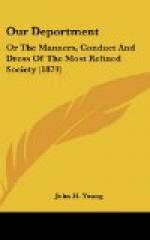It is the husband’s duty to join with his wife in all her endeavors to instruct her children, to defer all matters pertaining to their discipline to her, aiding her in this respect as she requires it. In household matters the wife rules predominant, and he should never interfere with her authority and government in this sphere. It is his duty and should be his pleasure to accompany her to church, to social gatherings, to lectures and such places of entertainment as they both mutually enjoy and appreciate. In fact he ought not to attend a social gathering unless accompanied by his wife, nor go to an evening entertainment without her. If it is not a fit place for his wife to attend, neither is it fit for him.
While he should give his wife his perfect confidence in her faithfulness, trusting implicitly to her honor at all times and in all places, he should, on his part, remain faithful and constant to her, and give her no cause of complaint. He should pass by unnoticed any disagreeable peculiarities and mistakes, taking care at the proper time, and without giving offense, to remind her of them, with the idea of having her correct them. He should never seek to break her of any disagreeable habits or peculiarities she may possess, by ridiculing them. He should encourage her in all her schemes for promoting the welfare of her household, or in laudable endeavors to promote the happiness of others, by engaging in such works of benevolence and charity as the duties of her home will allow her to perform.
The husband, in fact, should act toward his wife as becomes a perfect gentleman, regarding her as the “best lady in the land,” to whom, above all other earthly beings, he owes paramount allegiance. If he so endeavors to act, his good sense and judgment will dictate to him the many little courtesies which are due her, and which every good wife cannot fail to appreciate. The observance of the rules of politeness are nowhere more desirable than in the domestic circle, between husband and wife, parents and children.
[Illustration]
CHAPTER XIX.
Home Training.
Our earliest and best recollections are associated with home. There the first lessons of infancy are learned. The mother’s heart is the child’s first school-room. The parents’ examples are first imitated by the child, whose earliest impressions are gained from them. In no way are evil habits more effectually propagated than by example, and therefore parents should be what they wish their children to be.
THE MOTHER’S INFLUENCE.
To the mother belongs the privilege of planting in the hearts of her children those seeds of love, which, nurtured and fostered, will bear the fruit of earnest and useful lives. It is she who must fit them to meet the duties and emergencies of life, and in this work of training she keeps her heart fresh and young, and thereby insures the growth of those powers with which nature has endowed her.




